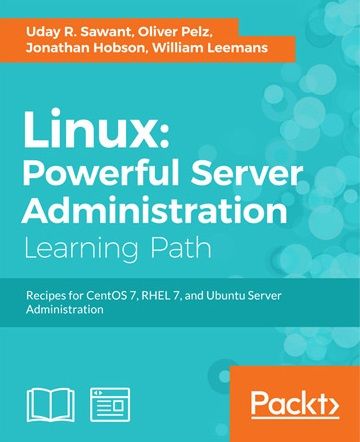Linux: Powerful Server Administration
Linux servers are often more stable, secure, and flexible than other server operating systems. In Linux: Powerful Server Administration, you’ll learn how to set up three powerful Linux servers: Ubuntu Server, CentOS 7 Server, and RHEL 7 Server. First, it starts with Ubuntu Server and shows you how to take advantage of the best features of Ubuntu. Then, by navigating to Java, you will gain knowledge of the latest version of CentOS, version 7. You’ll finally engage and touch the challenges of RHEL 7.
Headlines:
1: Managing Users and Groups
2: Networking
3: Working with Web Servers
4: Working with Mail Servers
5: Handling Databases
6: Network Storage
7: Cloud Computing
8: Working with Containers
9: Streaming with Ampache
10: Communication Server with XMPP
11: Git Hosting
12: Collaboration Tools
13: Performance Monitoring
14: Centralized Authentication Service
15: Installing CentOS
16: Configuring the System
17: Managing the System
18: Managing Packages with YUM
19: Administering the Filesystem
20: Providing Security
21: Building a Network
22: Working with FTP
23: Working with Domains
24: Working with Databases
25: Providing Mail Services
26: Providing Web Services
27: Operating System-Level Virtualization
28: Working with SELinux
29: Monitoring IT Infrastructure
30: Working with KVM Guests
31: Deploying RHEL “En Masse”
32: Configuring Your Network
33: Configuring Your New System
34: Using SELinux
35: Orchestrating with Ansible
36: Puppet Configuration Management
37: Yum and Repositories
38: Securing RHEL 7
39: Monitoring and Performance Tuning
Specifications:
Author: Uday R. Sawant
Publisher: packtpub
Year of publication: 2017
Number of Pages: 1920
Size: 19.9 MB

